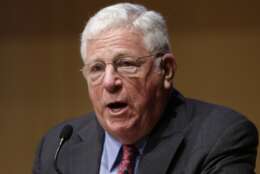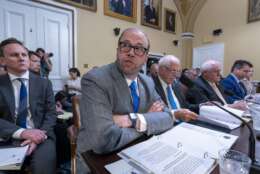National & World Headlines
-
President Joe Biden’s pick to serve as America’s top military officer is warning senators of the difficulties posed by any potential conflict in Asia and describing how he would use lessons learned from the Ukraine war to help the U.S. military prepare. But Air Force Gen. CQ Brown Jr. may not be able to apply those lessons anytime soon. His nomination to be the next chairman of the Joint Chiefs of Staff is among more than 260 that are being stalled by a Republican senator in protest over Pentagon policy that pays for travel when a service member has to go out of state for an abortion or other reproductive care.
July 11, 2023 -
The U.S. Marine Corps is without a confirmed leader for the first time in a century as Gen. David Berger stepped down as commandant and a Republican senator is blocking confirmation of his successor. Berger took over in July 2019, and must leave the job after four years. Gen. Eric Smith, the assistant commandant, has been nominated to be the next leader, but will serve in an acting capacity because he hasn’t been confirmed. Sen. Tommy Tuberville of Alabama has stalled all senior military nominations because he disagrees with Pentagon policy that funds travel for service members to go out of state for an abortion or other reproductive care.
July 10, 2023 -
The Pentagon is announcing its plans for tightening protections of classified information following the explosive leaks of hundreds of intelligence documents that were accessed through security gaps at a Massachusetts Air National Guard base. Defense Secretary Lloyd Austin has directed that all secure rooms where classified information is stored and accessed get increased levels of physical security, additional controls to ensure documents aren’t improperly removed, and electronic device detection systems. The security upgrades come as a lone airman, Jack Texeira, is accused of leaking highly classified military documents in a chatroom on Discord, a social media platform that started as a hangout for gamers.
July 05, 2023 -
A judge on Tuesday prohibited several federal agencies and officials of the Biden administration from working with social media companies about “protected speech,” a decision called “a blow to censorship” by one of the Republican officials whose lawsuit prompted the ruling.
July 04, 2023 An Army combat veteran with extensive cybersecurity and counterterrorism experience is taking over as one of the nation’s top election security officials. Jen Easterly, the director of the U.S. Cybersecurity Infrastructure Security Agency, made the announcement Friday. In the position, Cait Conley will coordinate with federal, state and local officials responsible for ensuring elections are secure ahead of the 2024 election. Conley takes over duties from Kim Wyman, who will depart at the end of July. Wyman joined the agency after the 2020 election in which CISA leadership was blasted by former President Donald Trump for countering false claims about the vote.
June 30, 2023-
In today's Federal Newscast, lawmakers are again trying to change how marijuana use factors into a security clearance decision.
June 29, 2023 -
Former U.S. Senator and Connecticut governor Lowell P. Weicker Jr., has died following a short illness. He was 92. Weicker's death was announced Wednesday by his family. Weicker was a freshman Republican senator when he gained national prominence for his tough questioning of Nixon administration officials during the Watergate hearings in 1973. In his single term as governor, elected as an independent candidate, Weicker restructured Connecticut’s revenue system, shepherding in a new income tax despite strong and vocal opposition from many taxpayers.
June 28, 2023 -
More than $200 billion may have been stolen from two large COVID-19 relief initiatives. That's according to new estimates from a federal watchdog investigating federally funded programs designed to help small businesses survive the worst public health crisis in more than a hundred years. The numbers issued Tuesday by the U.S. Small Business Administration inspector general are much greater than previous projections issued by the office. They underscore how vulnerable the Paycheck Protection and COVID-19 Economic Injury Disaster Loan programs were to fraudsters, particularly during the early stages of the pandemic. The Small Business Administration disputed the new figures, saying the report “contains serious flaws that significantly overestimate fraud.”
June 27, 2023 -
New York's former lieutenant governor and longtime civic leader Richard Ravitch has died at the age of 89. Ravitch was best known for steering New York through the fiscal crisis of the 1970s and helping to stabilize the MTA in the early 1980s. He remained an influential figure in New York politics after leaving the MTA in 1983, heading the Charter Revision Commissioner and rescuing the Bowery Savings Bank. He was appointed in 2009 to serve as lieutenant governor by David Paterson. Gov. Kathy Hochul described Ravitch as “a titan of New York’s civic world who left an indelible mark” on the state.
June 26, 2023 A former FBI analyst has been sentenced to nearly four years in prison for keeping classified documents at her home in North Kansas City, Missouri. Kendra Kingsbury pleaded guilty in October to two counts of unlawfully retaining documents related to national defense. She was sentenced Wednesday to three years and 10 months in federal prison. Federal prosecutors said Kingsbury held a high level security clearance, which gave her access to national defense and classified information. During her employment from 2004 to December 2017, she took 386 sensitive government documents home. Prosecutors say she has declined to provide a motive. She was most recently living in Garden City, Kansas.
June 22, 2023Senate Majority Leader Chuck Schumer says the development of artificial intelligence is a “moment of revolution” that requires swift action from the government. Schumer said Wednesday that he is working on ambitious bipartisan legislation dealing with AI. Worries about artificial intelligence systems outsmarting humans and running wild have intensified in recent months with the rise of a new generation of highly capable AI chatbots such as ChatGPT. President Joe Biden convened a group of technology leaders in San Francisco to debate what he called the “risks and enormous promises” of artificial intelligence.
June 21, 2023President Joe Biden has convened a group of technology leaders in San Francisco to debate the risks and promises of artificial intelligence. The Biden administration is seeking to figure out how to regulate the emergent field of AI, looking for ways to nurture its potential for economic growth and national security and protect against its potential dangers. Biden says, “We’ll see more technological change in the next 10 years that we saw in the last 50 years,” adding that “AI is already driving that change.” His meeting Tuesday included eight technology experts from academia and advocacy groups.
June 20, 2023-
The Pentagon says it overestimated the value of the weapons it has sent to Ukraine by $6.2 billion over the past two years, resulting in a surplus that will be used for future security packages. The total surplus is about double early estimates. Pentagon spokeswoman Sabrina Singh says a detailed review of the accounting error found that the military services used replacement costs rather than the book value of equipment that was pulled from Pentagon stocks and sent to Ukraine. As a result, the department has additional money to use to support Ukraine as it pursues its counteroffensive against Russia.
June 20, 2023 Officials say about 100 letters containing suspicious white powder have been sent to lawmakers and other public officials across Kansas. The Kansas Bureau of Investigation on Sunday upped the initial tally from 30 letters to about 100. No injuries have been reported. A Facebook post from the agency says preliminary tests are negative for common dangerous toxins. In emails sent to legislators and obtained by The Topeka Capital-Journal, the director of Legislative Administrative Services said the Kansas Highway Patrol had informed his office of the letters, which contain a return address of either Kansas City or Topeka.
June 19, 2023-
Days after the bipartisan deal on the debt limit became law, House Republicans proposed a slew of tax cuts, leading to charges of hypocrisy by Democrats in a squabble that shows clashing visions for the U.S. economy. GOP lawmakers are pushing deep tax cuts for companies and the affluent as the primary driver for sustaining economic growth. President Joe Biden and fellow Democrats seek more targeted tax cuts to achieve social goals such as reducing child poverty and shifting to renewable energy. The differences will come to the forefront in 2025, when the debt limit drama returns and tax cuts passed in 2017 are due to expire.
June 19, 2023










